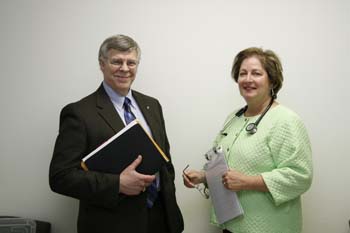| Back to Back Issues Page |
 |
|
VBPM Connection: News from your Doctor's Office January 23, 2014 |
Dear Patients and Friends,The Virginia Beach Premier Medical NewsletterJanuary, 2014
If you would like to receive a copy of this free monthly newsletter electronically by email, go to the Newsletter Signup Page on the office website (www.vbpm1.com) and enter your email address in the signup box.
If you have a topic that you would like to see appear in the newsletter, please let us know at gjwarth@gmail.com.
Twistle: Ask us about Twistle, a secure, encrypted email application linking you directly to the office or to your doctor. Get answers to your personal medical questions. Change your appointment. Get your lab or x-ray results. Request prescription refills. Keep us informed. Ask the staff or your physician for more information, or click on the link...Twistle. (Any communication by email or text messaging between patients and medical offices is required to be HIPPA-compliant and will be enforced by large fines. Please help us to make this transition to HIPPA-compliance by using Twistle - a free, password-protected program that can be used on your computer, smart-phone or smart-tablet.)
Technology for Health
Activity trackers and wifi electronic scales that sync with your smartphone help to make weight loss and exercise almost fun. We mentioned the Withings pulse and activity monitor in the last newsletter. Lots of other companies are getting in on the health-technology wagon.
The newest thing is the smartwatch. Pebble seems to make the best one out there as far as I can see, but there are other manufacturers as well. It syncs with apps on your smartphone and can track your activity, weight, sleep patterns as well as receive text messages, reminders, calendar events and email notifications. You can even remotely control taking pictures with your smartphone! The initial smartwatches have been a little clunky in appearance, but the fashionistas and aesthetics departments will be improving on that soon. Adding voice recognition will definitely be a plus, but it's not available yet.
Best New Year's Resolution: Focus on Health!
 This year, let's not think "Diet" (groan), let's think "Get healthy!".
This year, let's not think "Diet" (groan), let's think "Get healthy!".
Here are 10 things you can do to live a better, healthier lifestyle: 1. Eat slowly. Give your brain time to recognize when you're not hungry any more. Don't keep eating when you're already full. 2. Portion control - Avoid overloading your plate or ordering too much food if you're eating out. The more food that's on your plate, the more you will eat. (We don't want to waste it because of those starving kids in Africa.) Use smaller plates - the portions will look larger. When at a restaurant, try ordering one meal and splitting it with your spouse. Or just order an appetizer - That's usually big enough for most of us for a regular meal. 3. Eat more of the right things - Fewer carbohydrates, which tend to make you want more of the same. More protein and fiber. LOTS of vegetables to fill up the empty spaces. Avoid fried foods. Eat more fish. Less butter and Mayo - they add a lot of calories but don't fill you up. No regular soda - each one has 100 calories. Use iced tea or Crystal Light or water for your standard drink. 4. Don't skip meals - your body goes into starvation mode in which case you won't burn as many calories in your daily activity as you would otherwise. Plus, this causes lack of energy which reduces your activity so then you really reduce your calorie burning capacity. 5. When you are thinking about having a snack, you should also be thinking, "Am I really hungry?" 6. If you're snacking because of stress, instead of quickly going for comfort food, substitute some other activity that you enjoy. 7. Exercise - even a little - Start with just 5 minutes a day, but make it a routine, just like brushing your teeth. Gradually increase as you can. 8. Incorporate physical activity into your day as much as you can. Take the stairs. Park far away. Use the upstairs bathroom instead of the one downstairs. Go shopping with your spouse - walk around the mall, or the home improvement store to give you ideas for other activities you can do at home. 9. Take care of your health as much as you do your car, your home or your finances. Keep up on things you can do to prevent illness - get an annual physical, keep up on mammograms, colonoscopies and other routine checkups. 10. Enjoy your life. Think of the good things that happen and don't dwell on the bad. Enjoy happy moments with your family and friends. Enjoy quiet time alone as well. Read a funny story every day. Try to keep a healthy, balanced outlook on life as much as you can. Don't worry excessively about things you can't do anything about. Be friendly and compassionate to others and it will be returned many times over.
NSAIDs and Cardiovascular Risk
Ever since aspirin first hit the shelves, NSAIDs (Nonsteroidal Anti-Inflammatory Drugs) have been a big part of our lives. They are great for mild to moderate general pain and help in reducing inflammation caused by arthritis and other conditions. Most people tolerate them fairly well, but there are many who can't or shouldn't take them.
NSAIDs are known to cause ulcers, gastritis, gastrointestinal bleeding, severe kidney disease, hypertension, fluid retention,etc. to name a few. The newest problem to be added to this list is that they can cause or worsen cardiovascular disease. Of course Vioxx was taken off the market as a result of this problem. Celebrex, which is still around, can also be a culprit. Even drugs like Ibuprofen and diclofenac, which are commonly for arthritic pain contribute to heart disease. Naprosyn or Aleve (brand names for naproxen), however, seem to be much less likely to be a problem with regard to heart disease, at least. A recent meta-analysis involving over 300,000 people, found that naproxen even in high doses did not cause cardiovascular, coronary or other vascular events. Therefore, Naprosyn (Rx), and Aleve (OTC) are now considered to be the preferred NSAIDs to use in those who have cardiovascular disease or who have significant risk factors for these diseases. New Guidelines for Chronic Aspirin Use
Previously, it has been said that, aspirin should not be used for primary prevention of stroke and heart attack, because there was no evidence to support that. We KNOW that it helps to prevent secondary strokes and heart attacks (i.e., the ones that occur after a first stroke or heart attack has already occurred).
We also know that aspirin has a beneficial effect on reducing risk of various kinds of cancer. A recent meta-analysis designed to follow the effect of aspirin on both cardiovascular disease and cancer combined found that at age 50 and over, the regular use of aspirin at a dose of 75-100mg per day reduced the overall risk of death. Therefore, evidence now suggests that the daily use of low-dose aspirin for the average person over age 50 who has no known increased risk of bleeding is more beneficial than it is harmful. Having said that, anyone who is concerned about the potential bleeding risk of aspirin may reasonably choose not to take it for primary prevention of heart attacks or strokes.
Are Nuts Healthy?
A recent study in the New England Journal of Medicine demonstrated definitively that the greater the consumption of nuts, the lower the mortality risk even after extensive correction for multiple confounding variables. This is true for both men and women, and it doesn't seem to matter what kind of nut is consumed.
The data were obtained from questionnaires answered by 76,000 women and 46,000 men over a 30-year follow up period. The results are consistent with a previous study of the Mediterranean diet which promotes substantial nut intake and which is associated with lower cardiovascular mortality.
Which Type of Vitamin D Is Best?
If your vitamin D level (25-hydroxy vitamin D, to be exact) is low, then your bones are in trouble of becoming osteoporotic and your risk of fracture becomes greater as the years go on. So, we usually like to draw vitamin D levels on all our patients at least once a year. If your level is low, your doctor will usually tell you to start taking a vitamin D supplement over the counter - usually in a dose of 1000 to 4000 units a day; unless it's really low, then he or she might write a prescription for 50,000 units once or twice a week.
If you're challenged with buying vitamin D over the counter, how do you know which one to get? German researchers have discovered that taking vitamin D3 supplements helped to increase vitamin D levels in the blood much more significantly than did the vitamin D2 supplementation in a group of 107 randomized volunteers. So now we know - Vitamin D3 it is!
Medical Marijuana
Medical marijuana (THC-tetrahydrocannabinol) has been in the news a lot lately, especially since its use in 20 states has been legalized, although recreational use has been legalized so far in only one state.
Marijuana for medical use dates back to ancient times. American physicians employed its use for many conditions until it was declared illegal in 1942, primarily because of its high abuse potential. Scientific research on its use has been hindered considerably by its illegal status. The American College of Physicians recommends that it be used for the following conditions: ~ to stimulate appetite in certain HIV/AIDS patients with wasting syndrome ~ as an anti-nausea medicine for cancer patients ~ as a treatment for cancer pain ~ to help reduce eye pressure in glaucoma patients ~ to reduce severe muscle spasms in patients with multiple sclerosis and spinal cord injury
New Treatment Recommendations for minor stroke and TIA
Previously, the initial treatment for minor stroke and/or TIA(transient ischemic attack, AKA "ministroke") for patient who had never had one in the past and who had not been taking any blood thinners, was to start aspirin alone within 24 hours of the event.
A recent study showed that the use of TWO anti-platelet drugs (aspirin and clopidogrel) were superior to aspirin alone in preventing new strokes after one episode had already occurred. There were 11.7% of new strokes occurring in the aspirin-alone group vs. 8.2% in the aspirin-and-clopidogrel group.
Human Microbiome
You may be hearing more about the human microbiome in the near future. This refers to the normal bacterial populations that lie within all of us. We've been assuming all these years that these bacteria don't really affect our health much. However, a tremendous amount of new research is showing that these normal bacteria are coexisting with our cells and interacting with our genome in ways that really do affect our health.
Variations in the human microbiome have been linked to obesity, psoriasis, non-alcoholic fatty liver disease, asthma and even autism. In one study in which the genetic data from gut bacteria of obese humans were placed in lean mice, those mice became obese. The mice that received bacterial genetic data from lean humans remained lean. Certain types of gut bacteria have been identified that seem to cause colorectal cancer. Researchers have found that humans with a certain "microbiome signature", derived from the types of bacteria that are residing within them, can be better predictors of type 2 diabetes than their human genome. In other research, it has been discovered that certain gut bacteria transform chemicals from red meat into other chemicals that can cause cardiovascular disease. This is early research, but it may revolutionize medical treatments in ways that we can't even foresee right now. Imagine the ability to prevent diabetes by taking a medicine that increases or decreases different strains of normal bacteria in our intestinal tracts.
Perfume, Pets and Allergies
If you've ever known someone who has allergies, you know that sometimes exposure to certain things like pet dander and perfume can be quite distressing and can even precipitate a severe asthma attack.
So, when coming into the office, in order to protect our patients and office staff, please refrain from wearing perfumes and bringing in pets. We will be forever grateful. About Our Office
Virginia Beach Premier Medical is a membership internal medicine practice specializing in comprehensive and compassionate, individualized and personalized patient-centered care. We pride ourselves on full continuity of care – in the office, in the hospital, or even at home.
If you would like more information about our practice please call us at 757-416-6750 or visit our website at www.vbpm1.com. Ask to speak with Brittany, our office manager, or Dr. Parks or Dr. Warth. We’d be happy to talk with you anytime.
Stay Warm ! |
| Back to Back Issues Page |





